
JACK DAWSON DDS
Miller County's home grown dentist.
By Joe Pryor
Jack Dawson DDS began his practice of dentistry in Eldon in April of 1946. He has been the family dentist over the years for thousands of people of all ages from all parts of Miller County. However, some may never have known about the circuitous route his grandfather David Dawson took to finally settle in Ulman, Missouri. Many years ago before the turn of the century, David had left Miller County to move to Indian Territory in Oklahoma to acquire land available to his wife, Jack's grandmother, because she was part Cherokee Indian. But prior to that the Dawsons had lived in a small town called Teal on the North side of the Osage River where David owned eighty acres of land. Teal was located about twelve miles downstream from Tuscumbia which Jack says had a ferry which regularly transported people to mass to a Catholic Church on the other side of the river. I had not known of Teal until Jack told me, so I asked Peggy Hake about it. Peggy, who is the penultimate source for everything Miller County, told me the following:
"Teal was in the extreme southern part of Cole County, across the river from Miller County and the small settlement of Hoecker. It also was located northeast of present-day Henley in Cole County......Today they have an area in that same general location that is called "Teal Bottoms". The Catholic Church was probably the first one built at Old St. Elizabeth on the southeast bank of the Osage. About 1882 they moved the town inland to its present site and re-established a church (St. Lawrence) there at the time........
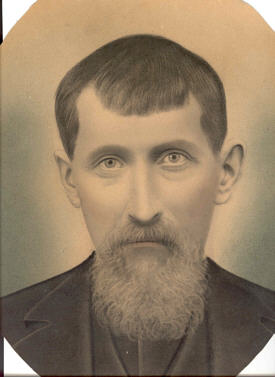 David Dawson |
|
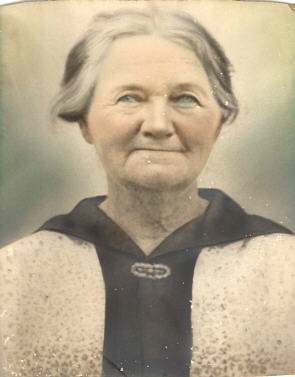 Eliza Dawson |
Unfortunately, David Dawson owed four dollars in back taxes on his property near Teal, and being without cash at the time, lost the farm at a sale on the courthouse steps. After moving to stay for awhile on the Jerry Setser farm in Miller County, David decided to make the move to Oklahoma by way of covered wagon with his family. Although in Oklahoma he was in possession of 640 acres, he didn't have a profitable experience trying to farm in that area so he moved with the family back to Lebanon, Missouri where he ran a café for four years. However, David eventually decided to return to Miller County taking the family to Ulman where he settled on 120 acres. The first house was made of logs which was the house in which Jack was born. Jack describes the house as having two similar rooms up and downstairs, with a cistern in the kitchen for washing and eating. All the logs and lumber were cut off the farm by the family. According to Jack, the house was "cold in winter and hot in summer." David died when Jack's father, Barney, was only thirteen years old, and Barney was left with the responsibilities of helping his mother manage the farm as well as care for his two sisters. To add to this unfortunate turn of events, the family found out later that the land they left in Oklahoma was discovered to have a huge oil reservoir underground which, according to Jack, is still producing today. Barney remained on the farm, married, and raised a family of two girls and one boy, Jack, who was born in 1919. The family's fortunes were better after a few years such that Barney was able to build a seven room house with basement and bath for 2300 dollars. This house was substantial and is still standing today according to Jack.
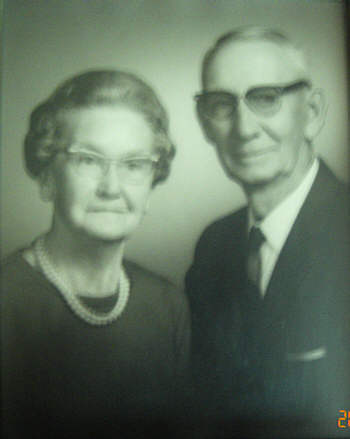 Ann and Barney Dawson Jack walked to Howell Grade School daily during the school year which was about a mile away. His first teacher was Ruth McCommons, who later with her husband Dorsey Barrons, took over the ownership of the Hauensteins grocery store in Tuscumbia. Other teachers at Howell were Grace Hix, Marjorie Hix, Nita Patterson (who now has reached the century mark in age and is residing at the Miller County Nursing Home), and Dorothy Doubikin. High School was attended at Brumley, Missouri where Jack remembers many good friends including his best friend, Clydie Bass, who was killed later in WWII; Holmes Steen (who was my wife's father); Windorf Sooter, who was a son of the "New Light" evangelist Charles Sooter; Churchill Brumley; Faye Robinson; Norma Jean Hawkins; as well as Jack's sister, Geraldine.
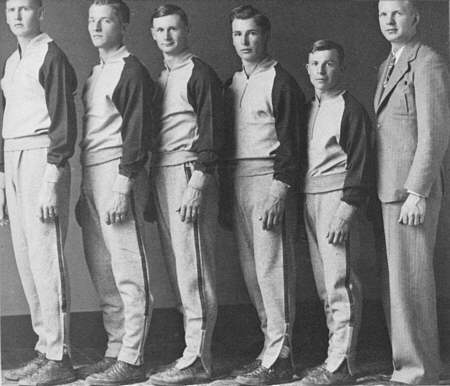 Brumley Basketball Team, 1936-1937 The Brumley High School Senior Class of 1937 had a very good basketball team which went to the State Tournament that year. The Fiftieth Anniversary of Bagnell Dam book (published by Union Electric but no longer in print) states: "Jack Dawson was an outstanding guard and team man. When there was a need to control an aggressive opponent, Jack got the assignment." In a two year span, the team lost only one home game.
After High school Jack attended the Iberia Junior College under the leadership of Professor George Smith. Jack said he worked his way through the two years of junior college milking and caring for two cows owned by the school as well as cutting wood. Over those entire two years, his only fee owed to the school was ten dollars. He mentioned he was in school there the same time as David Bear, an uncle of mine, as well as Don Pemberton, a cousin of my wife. Jack also remembered Dean (Umstead) Dowling who recently moved back to Eldon after a long career of teaching in some of the western states. Dean, who now is ninety seven year of age, is another distant cousin of mine. Jack and I agreed that the Iberia Academy had been a very important influence on the lives of Miller County residents during its existence in the last part of the nineteenth and first half of the twentieth century. The reason for this success more than any other was because school director, Professor George Byron Smith, with the help of his wife Mabel, was so adept at directing the school. Many Miller County residents went on to other higher institutions of learning well prepared because of the efforts of Professor Smith. Jack remembered one anecdote about Professor Smith which indicated a mischievous aspect to his personality: Jack recounted that a couple of boys had been sneaking out the school horse and buggy for a ride once in a while. One night, the professor, forewarned, suspected they were about to repeat their trick so he hid in the back of the buggy under some blankets and once under way scared the daylights out of the boys as he rose up covered head to toe by the blankets to yell some unearthly epithet which quickly caused a sudden exit from the carriage by the boys as well as scared the horses such that the professor had to turn his attention to controlling them. But the boys never knew what it was that came up from nowhere behind them because they had hightailed it back to the dormitory without ever looking back. Read more about the Iberia Academy in our website under the "Cultural" heading where "schools" are featured.
After being graduated by the Junior College at Iberia Jack first thought about teaching, but ultimately, due to the influence and encouragement of Dr. Taylor, an Eldon dentist for whom Jack's mother had worked in the past, Jack decided to apply to the Kansas City Western Dental College, which now is known as the University of Missouri School of Dentistry. Jack was accepted and took a bus to Kansas City with only a "tin" suitcase containing all his belongings. A street car took him to the school where he met the Dean who asked him how much money he had. Jack replied, "five dollars" fearing that his trip was all for naught since he had no funding, scholarship or sponsorship. All he had was the recommendation of Dr. Taylor. However, the Dean must have been prepared for such things for he gave Jack a job at the school and Jack took two other jobs waiting tables to earn his room and board.
One day, near the end of his tenure at the dental school, Jack was called upon to examine a young lady for a routine dental check. Although Jack was immediately smitten by the grace and charm of his new patient, his bedside manner may have fallen a bit short, for, although no cavities were discovered, Jack, thinking she was very fortunate to have no cavities told her, "You need to wash your teeth more!" However, always optimistic, Jack thought he saw a glimmer of interest in the girl's eyes, but being a bit bashful, he waited a month to call her apartment. On calling, the phone was answered by the young woman's roommate whom Jack could hear exclaiming in the background, "Your bashful boy is on the phone". Things didn't improve immediately because on the first date, Jack forgot to pick up the bill and the girl, whose name was June Lasley, embarrassedly pulled money out of her purse and paid it herself. However, they talked much of the night and, demonstrating it can be possible, fell in love at "first sight" a result of which they were married within two weeks, a marriage which lasted more than half a century until her untimely death four years ago. But early on, just before that marriage years ago, Jack was still having planning and organizing problems. Somehow or other, his fiancée ended up paying for the ring and marriage license! June was from Liberal, Missouri where she was blessed with a large family of siblings, all of whom were very successful with their lives. June and Jack had four children one of whom, Gary Dawson, currently practices dentistry in Eldon.
After being graduated from dental school in 1943, Jack was retained by the Navy to teach for a few months, but later was assigned for one year to the ship USS Tripoli, based out of Pearl Harbor, where Jack was the only dentist for three thousand sailors.
Returning home after the war, Jack had to begin his practice in Eldon with equipment forty five years old, purchased from Dr. Joe Taylor, because nothing new was available. Some of his tools and instruments were army surplus. His first office was over the Buehler drug store but he moved later to an office in the Henley Jewelry store before moving to his own office building on Maple Street where Gary, Jack's son, joined him and is practicing today.
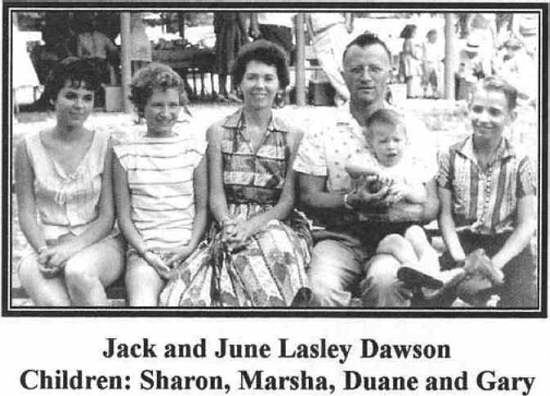 Jack and June Dawson & Family Jack has always been interested in his family history, and in fact has written an extensively researched genealogy about the Dawson family tracing it back to Wales in Great Britain. The family first came to Pennsylvania, then to North Carolina, Kentucky, and finally Missouri. The family history has been well organized along with many pictures and even includes much information about related branches many of which have names of well known Miller County families. Jack loves to discuss genealogy not only about his family but other distantly related people with well known Miller County names, many of whom he remembers from his childhood growing up in the Ulman/Brumley communities. But now that he has spent more than half a century in Eldon, Jack can say that he truly is a friend of all those who call themselves "Miller Countians" whether to the North or to the South of the Osage River.
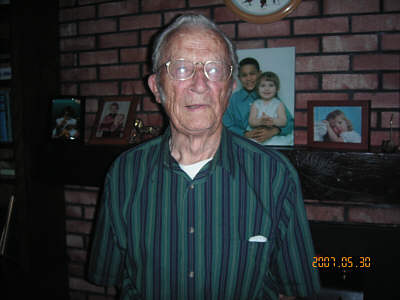 Jack Dawson, recent photo
DOUBIKIN 1871 - 1987, AN ENGLISH HERITAGE
Submitted by: Bertha Doubikin Harris, St. Elizabeth, MO.
Thomas Doubikin was an early pioneer who helped in the shaping of Miller County. He came to America from Dunholmn, Caenby Corner, Yorkshire, England at the age of 25 and bought the Big Tavern Creek farm on July 15, 1871. He married Ellen Hensley, daughter of John Hensley, one of the three commissioners who located the county seat Miller Co. at Tuscumbia in 1837.
Mr. Doubikin organized a general store and a U.S. post office, Caenby, at his home in 1876 and later organized a second post office, Ramsey on Humphreys Creek, which was 6 miles west of his home. A third post office, Claxby, was organized 6 miles east. Mail was delivered once a week at each of these post offices. These names were towns that had been near his ancestral home in England. He was a stockman, raising cattle, stock horses and mules. He was also a community leader and a bank official.
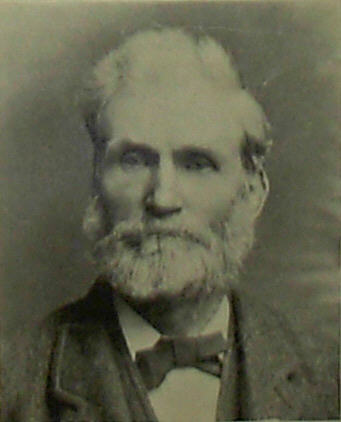 Thomas Doubikin Mr. Doubikin visited his home in England in 1873 and again in 1898. Since he would be gone two months, he had the government discontinue his Caenby post office in his home and ask his patrons to get their mail at Ramsey or Claxby in 1898. He was known throughout the country as a grand, old gentleman.
In 1881, Thomas bought more acreage to his farm and in 1902, his son, John Walter, bought these acres from his father when he married Annte Lee Shockley, daughter of John Shockley, a Miller Co. community leader and Justice of the Peace in Richwoods Township. John Shockley had served as a Sgt. in the Union forces during the Civil War. This part of Caenby has been in the Doubikin family continuously for 106 years. His father sold the earlier farm in 1907 to a Jefferson City family and his son, Walter, also bought it in 1911.
Living in Miller Co. in 1987 was one daughter of Thomas Doubikin, Minnie Doubikin Tyler, age 94 years of Iberia and one granddaughter, Bertha Doubikin Harris, who with her husband, Fred Harris, live at Caenby Corner, the home of her grandfather. (NOTE: Mrs. Tyler has since passed away living to a very advanced age).
JOHN WALTER DOUBIKIN
By Gerard Schultz, 1933
John Walter Doubikin is a prominent farmer of Osage Township. His farm is known as the Fairview Stock Farm. He was born in Miller County, March 1, 1883. His father, Thomas Doubikin, was born March 9, 1946, at Dunholm, England, and came to America in the late sixties. In 1871 he came to Miller County and began farming on the Big Tavern Creek about two miles below Wilson Cave, on the farm where his son now resides. He was a political leader in his community and established several post offices, known as Ramsey, Cainby, and Claxby.
He moved to Iberia in 1907 and helped to organize the Farmers and Traders Bank, of which he was vice-president and a charter stockholder. Although active in community and state affairs he took time to visit his old home in England. He crossed the Atlantic nine times.
John Walter Doubikin's mother, Nancy Ellen (Hensley) Doubikin, was born July 13, 1854, at Iberia, of Scotch parentage. Her father, John Hensley, was one of the commissioners appointed to locate the county seat of Miller County.
Mr. Doubikin was married to Miss Annie Lee Shockley, May 18, 1902, at Iberia. Her parents, John and Lucinda Shockley, were of Irish ancestry. To this union were born five children: Bertha; Lonnie, whose wife is Dona Brumley; Dorothy; Lillie; and Walter John, who is deceased.
Mr. Doubikin is well-known in Republican circles. He has been a member of the Republican Central Committee, road commissioner, school official, director of the Farmers and Traders Bank, and an official of the Missouri Farmers Association. HE is a member and trustee of the Fairview Christian Church.
DRIVING FORCES IN AREA HISTORY INSPIRED HARMONY
By Bob Watson
Jefferson City News Tribune, February 19, 1995
A century ago, William Driver Jr. was a teen-ager growing up in Eldridge, a small town between Camdenton and Lebanon in south-central Missouri. As a married young adult, he and his wife, Violet Mae Williams Driver, moved to the Miller County town of Iberia. They had eight children, one boy and seven girls.
"They were farmers like their neighbors," said Peggy Hake, a historian and genealogist in Miller County. "I know that they were highly thought of and very well-respected. They were just down-to-earth country people who blended in with their neighborhood." They also were black. And most of their neighbors were white.
In the early 1940s-at an age when most people consider retiring-Will Jr. and Violet moved to western Cole County and worked another farm near Centertown for more than a decade before finally retiring to a daughter's home in Jefferson City. Wherever he lived, Will Driver Jr. generally was accepted and respected as a member of the community-in spite of his race-in an era when a majority of Americans considered blacks inferior to whites.
"You know, I'm sure things could have been easier and things could have been better, but it wasn't all that bad at the time," said Minnie Driver Fulcher of Jefferson City, now 73, the youngest of Will and Violet Drivers' eight children. Although she experienced racism and separation because she was black, "we didn't have any big problems with the people," she said.
The music-maker
Throughout his adult life, Will Driver Jr. made his living off the land. But he perhaps was best known as a prize-winning fiddler. "I remember when he would go to those contests and he did good," Ms. Fulcher said. "Most of the time he would always win-either first or second prize." Cash prizes often were $10, $15 or $25. "He enjoyed it. We would have these 'house parties,' as they called them in those days, and he would play music. He did a lot of that," Ms. Fulcher said.
A Driver family history, first produced two years ago by Darleen Sears Goldston, a granddaughter whose interest in the family tree has made her the Drivers' unofficial historian, said: "Bill Driver's musical ability included: playing the piano, organ, fiddle, guitar, banjo, mandolin and harmonica; all very well. In fact, he played in many musical contests and quite often won first prize."
Grandson Ronnie Fulcher, now 54, spent a lot of time with his grandfather, Will Driver Jr., who was 104 when he died in 1986. Fulcher said one memory of his grandfather that stands out "is late at night, with him sitting out on the porch playing the fiddle and then getting comments from people from miles away, who would say, 'Late at night, we could hear him playing.' "You're talking 11, 12 o'clock at night, after working all day" on the farm near Centertown, Fulcher said.
Over 11 years ago, Ann Jenkins and historian Gary Kremer wrote an article for Missouri Life magazine about the town of Eldridge: "In fact, one of the most frequently mentioned 'good memories' recalled by blacks and whites alike was one of integrated community picnics that featured the fiddling of black musician Will Driver, son of the minister."
"No one we talked to failed to mention Will Driver," they wrote. "Driver has been called by one student of fiddle music 'the best example I encountered of a repertory strictly indigenous to a local area.'"
Annette Driver, now 38, a great-granddaughter, remembers occasional visits with him at their east-side Jefferson City home. However, she rarely heard him play music. But she remembers him as a man with a strong dedication to his family, and she wants others to remember her ancestors in the same way. To grandson Ronnie Fulcher, Will Driver Jr. 'was just a very cordial. stalwart, sensible individual, who seemed to always find a way to make things work for you."
Jefferson City roots
Will Driver Jr. was born December 8, 1881, in Eldridge, the town in northern Laclede County named for the general store it grew up around. (The store was founded by Alfred Eldridge, a black farmhand who decided there were enough people living in the area to warrant opening a general store. Kremer and Ms. Jenkins wrote in 1983.)
Will Jr.'s parents were William Anderson Driver Sr., a Baptist minister, and Susan Shipley. Will Jr. and his sister, Grace were the only two of the couple's eight children who survived into adulthood.
Will Driver Sr. was born of slave parents in Jefferson City. His birth name, gleaned from official records, was Frank Crawley. For reasons the family hasn't yet learned, Ms. Goldston said he was adopted and raised by William and Jane Driver, although a sister remained in Jefferson City with their parents.
Will Driver Sr. was considered a "prominent community leader" in Eldridge, Kremer and Ms. Jenkins wrote. "Driver served the black community as a minister and often preached to his congregation in the same church used by whites."
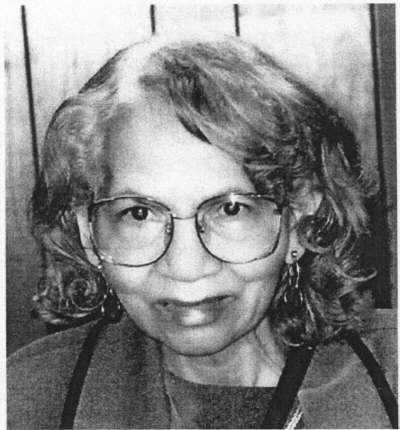 Minnie Mae (Fulcher) Driver Minnie Fulcher remembers some of his sermons as being the inspiring, almost fire-and-brimstone type. "I remember him building what we called then the brush arbor-like a church in the fields," she said.
But there was more, said her son, Ronnie Fulcher. Will Jr. said his grandfather reported "that (his father) not only was a minister, but a traveling salesman selling organs from the back of a wagon, traveling through central Missouri."
Ms. Hake, the Miller County historian, said she hand's heard that story. "I know he was a traveling evangelist," she said. "I would say that perhaps (the salesman) would be a little unusual.
Integration in Mid-Missouri
What may seem unusual to many in today's world was the general acceptance the Drivers and many of their black friends and neighbors had among white neighbors. Black communities dotted the landscape, Ms. Hake and Kremer said. Former slaves who left the South in droves after the Civil War stopped along the way when they found land they could buy and farm or when their money ran out. A number of all-black or integrated communities sprang up around those new farms, in areas that now mostly are all white.
"Both blacks and whites who lived together in Eldridge for the first forty years of the twentieth century remember that racial friction was relatively rare," Kremer and Ms. Jenkins wrote in the 1983 article. Kremer and Ms. Hake both say they're considering books on the history of some of those towns in rural Missouri.
Even in the 1940s and '50s-a time when racism was becoming a major national issue and the South was a growing hotbed of confrontation and violence-Ronnie Fulcher said, "I can even remember getting on the wagon (and) driving into Lohman and buying victuals or supplies."
While in town, his grandfather would stop by the local tavern and visit with others while drinking "two or three beers," Fulcher said. "There was no major hullabaloo about them coming into the place.
Segregation
But that kind of integration wasn't total or legal. State laws required black and white children to be educated in separate schools-and state aid wasn't given if the school population dropped below eight students. As the Industrial Revolution attracted more families to the cities and away from farms, many schools-especially those for blacks-closed. The lack of local education drove more families to move to larger cities, where more schools were available and the downward spiral continued.
Will Driver Jr., for example, went to school in Lebanon, 15 miles from his birthplace. And in Iberia, Ms. Hake said, "by the time the Driver children were of school age…they were probably the only black children left. So…their mother taught them at home.
Preserving history
Darleen Goldston began her history of the Drivers as a way to preserve her family's past. She distributed the first copies of her booklet at a family reunion. "If we don't start putting things down," she said, "all of our history will be lost."
Dr. William Ross, president of the Jefferson City chapter of the National Association for the Advancement of Colored People, said more families should preserve their history. "You look back to see what their life was like," he said. "This motivates you to do better in your own life."
Ross, Ms. Goldston and Ronnie Fulcher all worried about the effect of modern society on families' efforts to tract their roots. But Fulcher said he's learning something from his study, and his memories of Will Driver's life.
"I think what you see in my grandfather and his father are individuals whose character and skills and abilities maybe stood out a little more than the rest," he said. Will Jr. is "a perfect example of making something meaningful out of your life in spite of restrictive conditions," Fulcher said. "He took what the world gave him at that time.
"And, as best as he could see it, he made a meaningful life out of it that was a productive life, that was a helpful life and that resulted in that people who knew him, from all races, respected him.
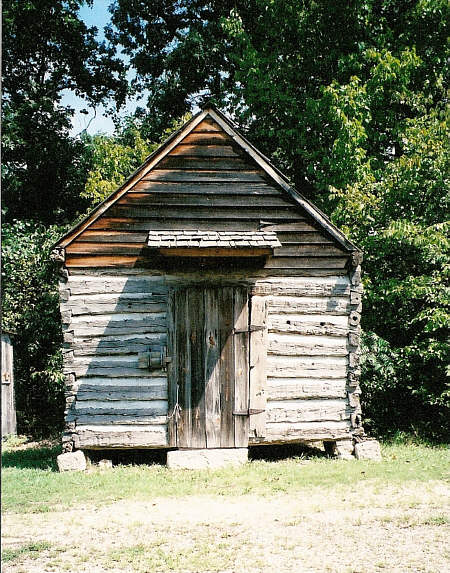 Williams Slave Cabin This is the slave cabin where Violet Mae Williams Driver was born. It was moved to the Miller County Historical Society from the Williams farm outside Iberia.
GEORGE WASHINGTON DUNCAN
By Gerard Schultz, 1933
George Washington Duncan, who since 1908 has been an able representative of the medical profession in Miller County, was born near Iberia on October 28, 1879. He is the son of James R. Duncan, who was born at Nashville, Tennessee, on September 18, 1851. His mother Sarah J. (Wilson) Duncan, was born ten miles north of Iberia on February 12, 1858. Her father, a captain in the Confederate Army, died at Springfield, Missouri.
Dr. Duncan was educated in the public schools of Maries County and the Iberia Academy, from which he graduated in 1904. He continued his studies in the medical department of Washington University, St. Louis, from which he graduated in 1908. Since that time he has proven his professional knowledge and skill by actual practice in Iberia. He is now a member of the Miller County Medical Society, Missouri State Medical Association, and American Medical Association.
Dr. Duncan has been very active in Republican politics in Central Missouri for 25 years. From 1912 to 1914 he was chairman of Miller County Republican Central Committee from the eighth congressional district. He was a delegate to the Republican National Convention at Chicago from the eighth district in 1916 and was a member of the executive committed of the Republican state Committee during the campaign of 1916.
On June 29, 1905, at Iberia, he was united in marriage with Miss Myrtle Viola Ramsey, daughter of Richard L. Ramsey and Mary Elisabeth (Capps) Ramsey. Mrs. Duncan is of native American stock. Both her father and her husband's father were staunch Republicans. Neither ever sought a public office, although both were untiring party workers. Mrs. Duncan has given her active support to the party to which her father and husband belong.
Dr. and Mrs. Duncan have three children: Dorothy Alice, born December 23, 1906, is a graduate of Drury College. She has taught in the public schools of Licking and Eldon. Her husband, Otis Grant James, is at present the athletic coach at Eldon. Byron Lambert Duncan, who was born on July 20, 1908, is also a graduate of Drury College. He was a delegate from the eighth congressional district to the Republican National Convention held at Chicago in 1932, and has the distinction of being the youngest elected delegate ever to attend a national nominating convention. Morris Dewayne Duncan was born May 23, 1919, and graduated from the Iberia Public School in 1933.
Dr. Duncan is a member of the Baptist Church and of the Masonic Lodge. Mrs. Duncan is now serving her third term as postmistress at Iberia. She is an interested worker in the Baptist Church, Eastern Star, Royal Neighbors, and civic organizations.
|

